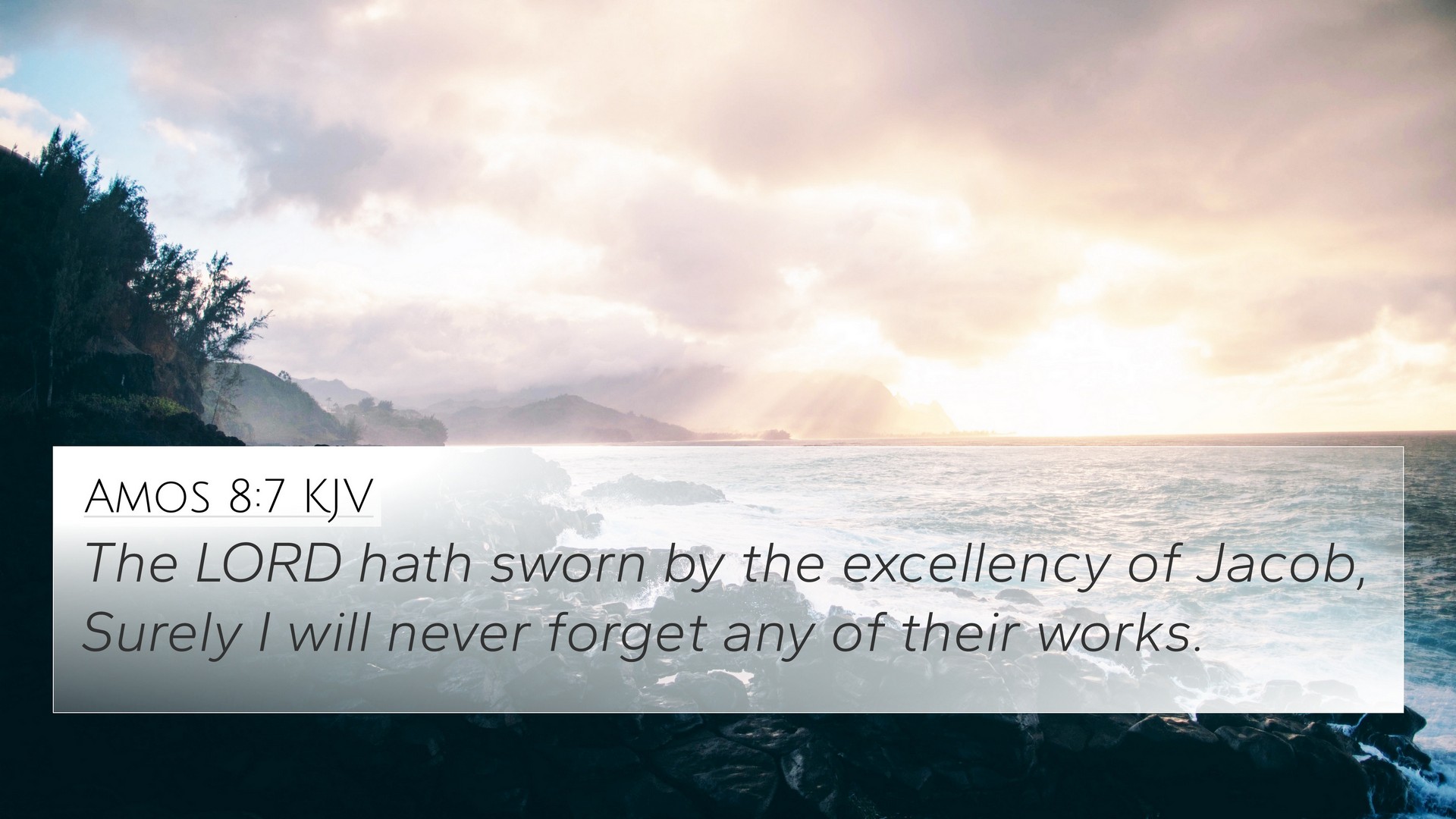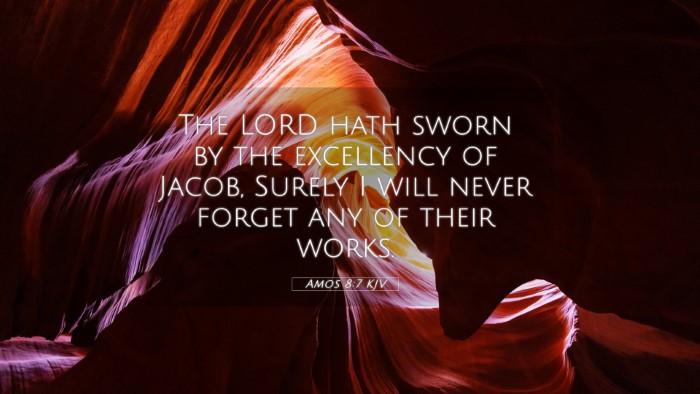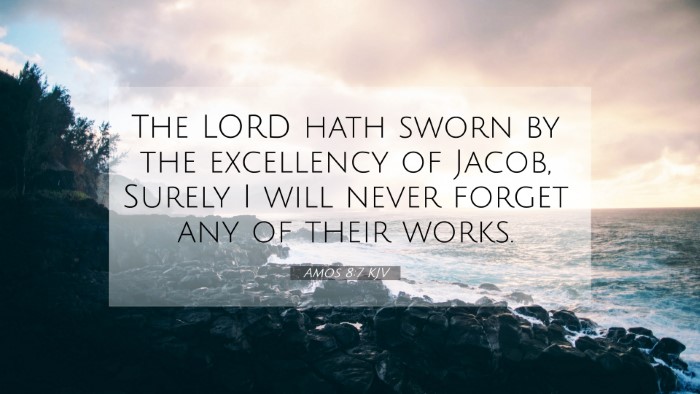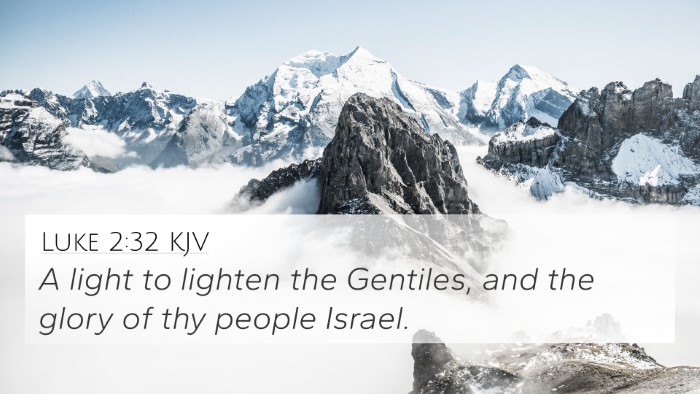Old Testament
Genesis Exodus Leviticus Numbers Deuteronomy Joshua Judges Ruth 1 Samuel 2 Samuel 1 Kings 2 Kings 1 Chronicles 2 Chronicles Ezra Nehemiah Esther Job Psalms Proverbs Ecclesiastes Song of Solomon Isaiah Jeremiah Lamentations Ezekiel Daniel Hosea Joel Amos Obadiah Jonah Micah Nahum Habakkuk Zephaniah Haggai Zechariah MalachiAmos 8:7 Similar Verses
Amos 8:7 Cross References
The LORD hath sworn by the excellency of Jacob, Surely I will never forget any of their works.
Uncover the Rich Themes and Topics of This Bible Verse
Listed below are the Bible themes associated with Amos 8:7. We invite you to explore each theme to gain deeper insights into the Scriptures.
Amos 8:7 Cross Reference Verses
This section features a detailed cross-reference designed to enrich your understanding of the Scriptures. Below, you will find carefully selected verses that echo the themes and teachings related to Amos 8:7 KJV. Click on any image to explore detailed analyses of related Bible verses and uncover deeper theological insights.
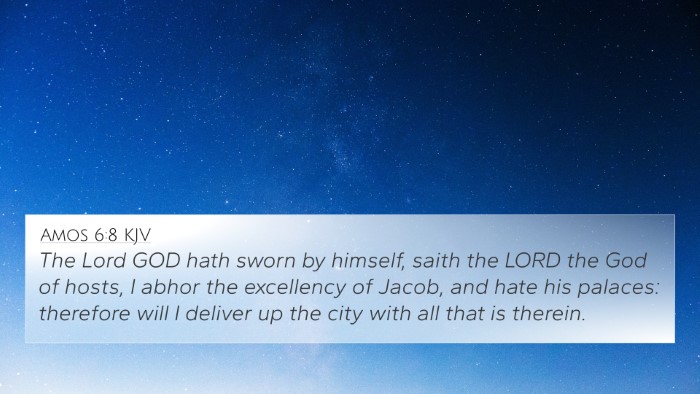
Amos 6:8 (KJV) »
The Lord GOD hath sworn by himself, saith the LORD the God of hosts, I abhor the excellency of Jacob, and hate his palaces: therefore will I deliver up the city with all that is therein.
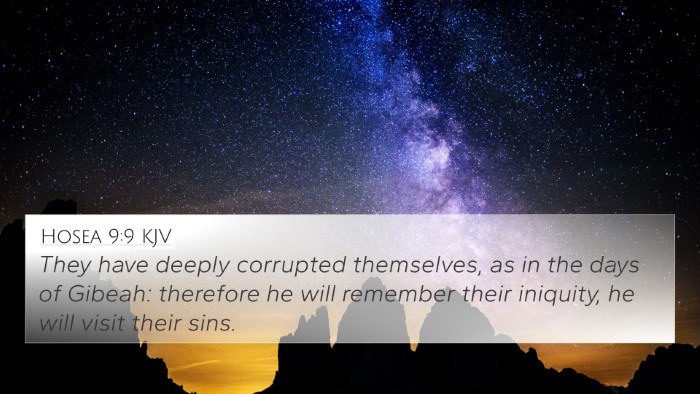
Hosea 9:9 (KJV) »
They have deeply corrupted themselves, as in the days of Gibeah: therefore he will remember their iniquity, he will visit their sins.
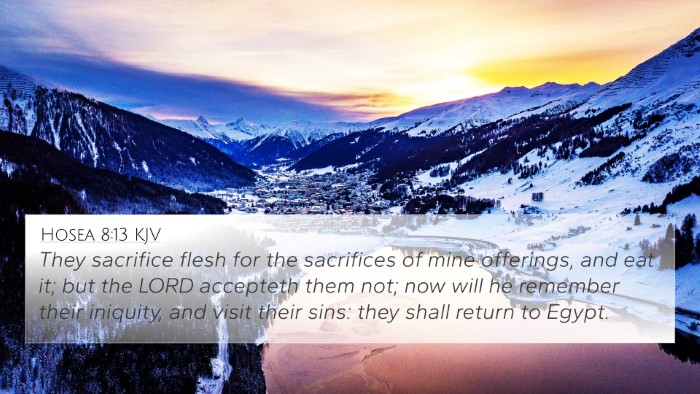
Hosea 8:13 (KJV) »
They sacrifice flesh for the sacrifices of mine offerings, and eat it; but the LORD accepteth them not; now will he remember their iniquity, and visit their sins: they shall return to Egypt.
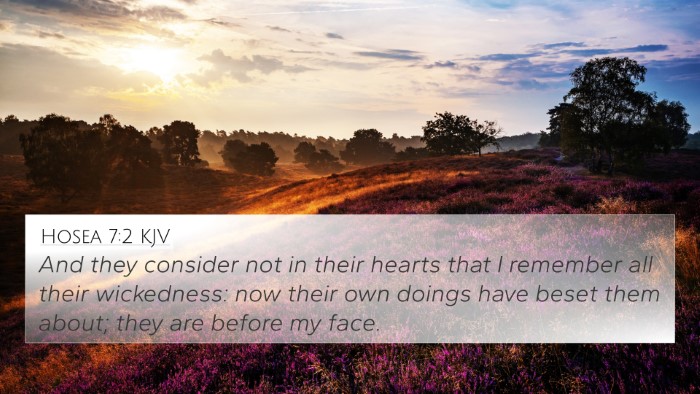
Hosea 7:2 (KJV) »
And they consider not in their hearts that I remember all their wickedness: now their own doings have beset them about; they are before my face.
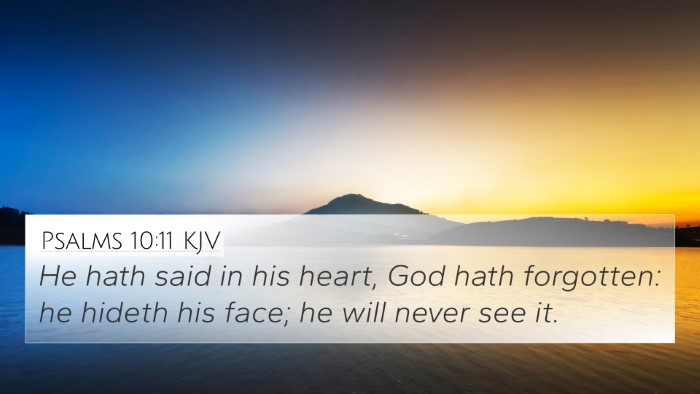
Psalms 10:11 (KJV) »
He hath said in his heart, God hath forgotten: he hideth his face; he will never see it.
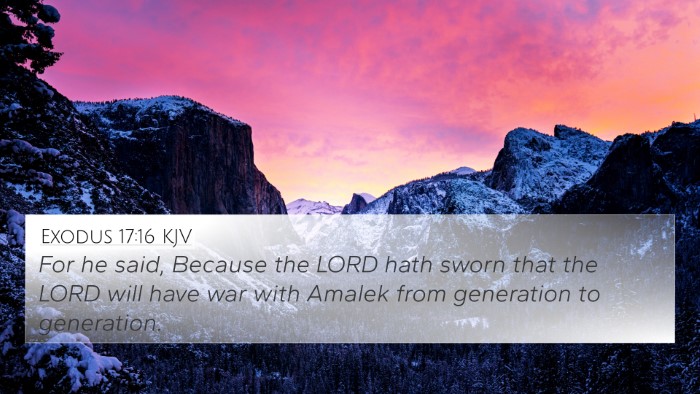
Exodus 17:16 (KJV) »
For he said, Because the LORD hath sworn that the LORD will have war with Amalek from generation to generation.
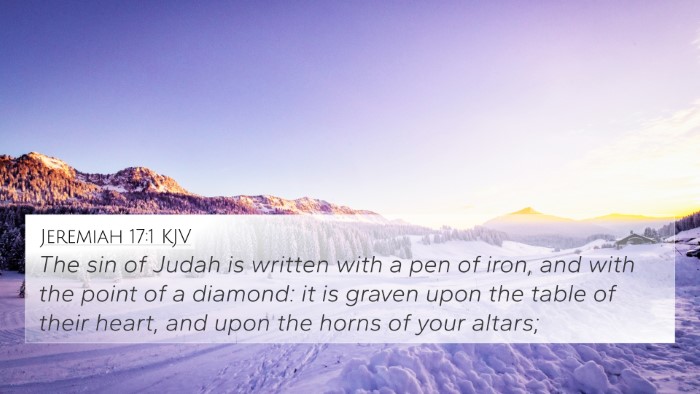
Jeremiah 17:1 (KJV) »
The sin of Judah is written with a pen of iron, and with the point of a diamond: it is graven upon the table of their heart, and upon the horns of your altars;
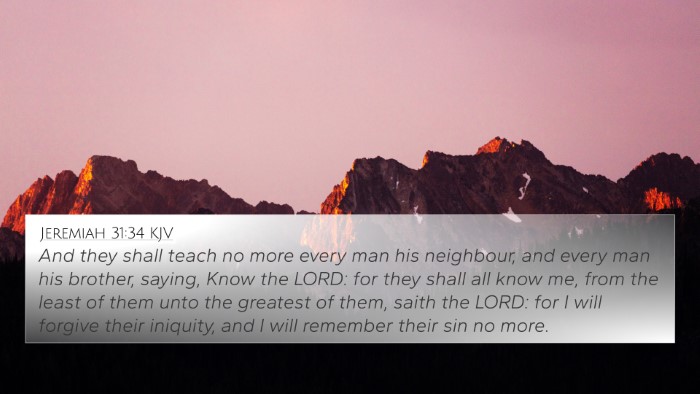
Jeremiah 31:34 (KJV) »
And they shall teach no more every man his neighbour, and every man his brother, saying, Know the LORD: for they shall all know me, from the least of them unto the greatest of them, saith the LORD: for I will forgive their iniquity, and I will remember their sin no more.
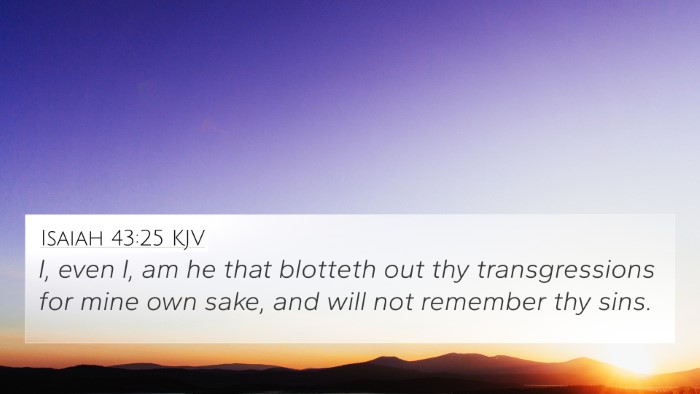
Isaiah 43:25 (KJV) »
I, even I, am he that blotteth out thy transgressions for mine own sake, and will not remember thy sins.
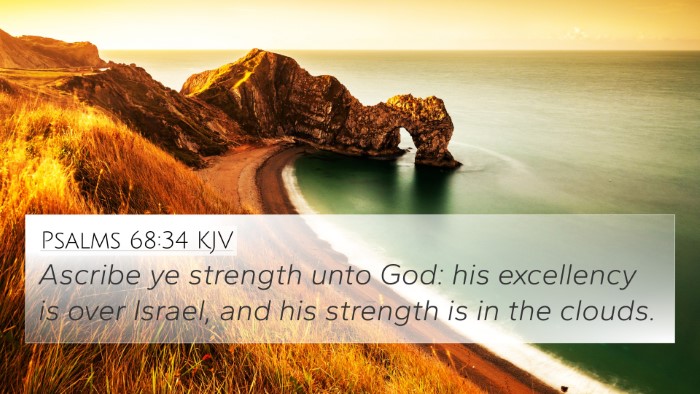
Psalms 68:34 (KJV) »
Ascribe ye strength unto God: his excellency is over Israel, and his strength is in the clouds.
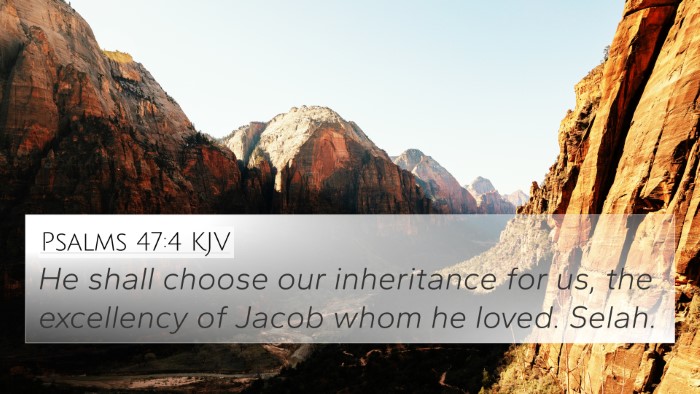
Psalms 47:4 (KJV) »
He shall choose our inheritance for us, the excellency of Jacob whom he loved. Selah.
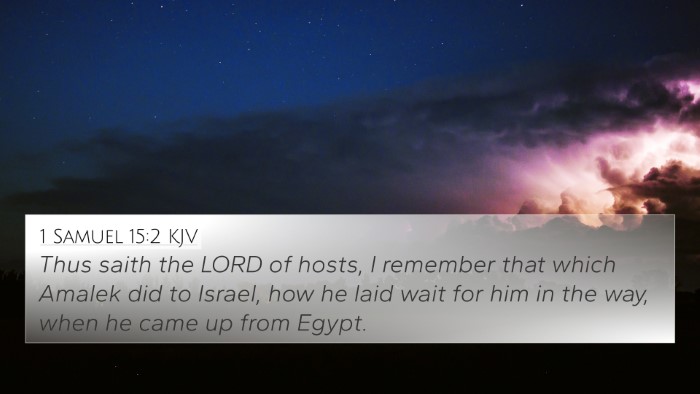
1 Samuel 15:2 (KJV) »
Thus saith the LORD of hosts, I remember that which Amalek did to Israel, how he laid wait for him in the way, when he came up from Egypt.
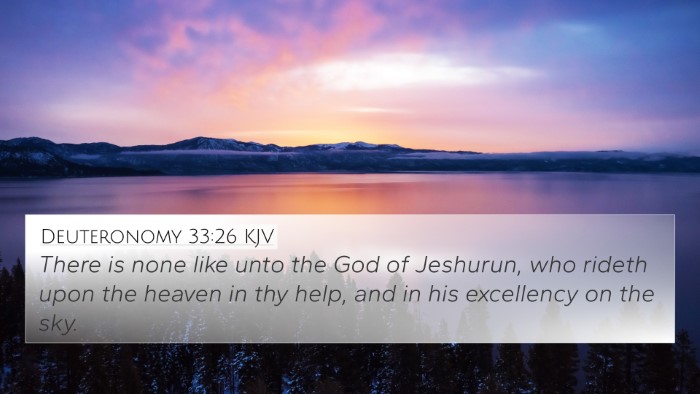
Deuteronomy 33:26 (KJV) »
There is none like unto the God of Jeshurun, who rideth upon the heaven in thy help, and in his excellency on the sky.
Amos 8:7 Verse Analysis and Similar Verses
Understanding Amos 8:7
Amos 8:7 states, "The Lord has sworn by the pride of Jacob: Surely I will never forget any of their deeds." This verse bears profound implications for both the immediate audience in ancient Israel and for modern readers of Scripture. The context of this proclamation conveys a strong message of God’s awareness of human actions and the certainty of divine justice. Let us explore this verse through a combined lens of various public domain commentaries.
Context and Significance
In discussing Amos 8:7, it’s essential to address the historical and societal context. The prophet Amos addresses the moral decay and injustices present in Israelite society. Matthew Henry emphasizes that God’s declaration reveals His unwavering vigilance over human behaviour, pinpointing the steadfastness of God's memory regarding human deeds. The "pride of Jacob" likely points towards the Israelites' vanity and self-reliance, contrasting their need for repentance and humility before God.
God's Oath and Its Implications
Albert Barnes underlines that God’s swearing by “the pride of Jacob” signifies the significance and weight of His commitment to justice. This affirmation highlights the seriousness of divine judgment and the inevitable recall of grievances against His people. Such an assertion reminds believers of the consequences of straying away from righteous living, reinforcing that nothing escapes God’s notice.
Divine Memory and Accountability
Adam Clarke provides insight into the idea that God's memory of deeds is not mere recall but an active engagement with those deeds that will ultimately impact judgment. The phrase “I will never forget” serves as a clear warning to the nation of Israel about the reality of accountability before God. Those who engage in unrighteous acts should heed this warning, as it underscores a major theme found throughout Sacred Scripture—the necessity of accountability to God.
Cross-References and Thematic Connections
This verse interacts with several others throughout the Bible, creating a tapestry of interconnected messages regarding divine justice and the moral responsibilities of humanity:
- Numbers 23:19 - "God is not a man, that he should lie, neither the son of man, that he should repent." This verse reinforces the notion of God's unchanging nature and reliability in His promises.
- Galatians 6:7 - "For whatever one sows, that will he also reap." This New Testament parallel emphasizes similar principles of divine justice as those discussed in Amos.
- Psalm 106:45 - "For their sake he remembered his covenant, and relented according to the abundance of his steadfast love." This verse also brings forth the theme of God's faithfulness even amidst human disobedience.
- 2 Chronicles 36:15-16 - This passage recounts God sending messengers to a wayward people, highlighting divine patience before judgment, ultimately related to the context of Amos.
- Matthew 12:36 - "I tell you, on the day of judgment people will give account for every careless word they speak." This forward-looking reminder connects with the idea of accountability expressed in Amos.
- Jeremiah 32:19 - "Great in counsel and mighty in deed, whose eyes are open to all the ways of the children of man." Here, we find another affirmation of God's omniscience and sovereignty.
- Proverbs 15:3 - "The eyes of the Lord are in every place, keeping watch on the evil and the good." This verse serves as a comfort and a warning, echoing Amos's sentiment regarding God's awareness of human actions.
- Hebrews 4:13 - "And no creature is hidden from his sight, but all are naked and exposed to the eyes of him to whom we must give account." This reinforces the accountability aspect required by God.
- Revelation 20:12 - "And I saw the dead, great and small, standing before the throne, and books were opened." This eschatological perspective affirms the permanence of God’s memory concerning deeds.
- Micah 6:8 - "He has told you, O man, what is good; and what does the Lord require of you but to do justice, and to love kindness, and to walk humbly with your God?" This viable call for living righteously echoes themes surrounding accountability in Amos.
Thematic Reflection
As we analyze Amos 8:7 in conjunction with the cross-references provided, several key themes emerge:
- Divine Justice: God’s commitment to justice is unwavering, and He remembers all deeds, rewarding righteousness and addressing wrongdoing.
- Moral Accountability: The verse serves as an admonition to live righteously, underscoring that God is always aware of human actions.
- God's Sovereignty: The Almighty’s sovereignty is affirmed through His active remembrance of our actions, coupled with the certainty that there will be consequences.
- Call to Repentance: The recognition of divine oversight compels a heart posture of humility and encourages individuals to turn back in repentance from their sins.
Conclusion
Amos 8:7 transcends its immediate context to offer timeless insight into God's nature and expectations for humanity. The coupled insights from revered commentaries illuminate the multi-faceted lessons encapsulated within this passage. Whether examining the verse for personal growth or preparing for a sermon, understanding its meaning through inter-Biblical connections fosters a deeper appreciation for Scripture as a cohesive narrative of divine justice, mercy, and accountability.
Further Study and Tools
For those wishing to explore more about cross-referencing Biblical texts, consider utilizing various tools available, such as:
- Bible concordances
- Bible cross-reference guides
- Cross-reference Bible study materials
- Bible reference resources
- Comprehensive Bible cross-reference materials
These resources will enrich your understanding of the Scriptures and their interconnectedness, enhancing both study methods and personal reflection.
